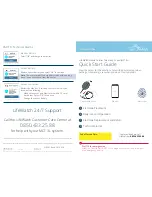
23
22
battery has been discharged, recharge it as soon as possible.
If the battery is stored more than 60 days, it may need to be
recharged.
(c) Do not short the terminals of the battery. This will cause the
battery to get hot and can cause permanent damage. Avoid
storing the batteries in your pocket or purse where the termi-
nals may accidentally come into contact with coins, keys or
any metal objects.
(d) WARNINGS:
1. Do not attempt to charge any other types of batteries in
your charger, other than rechargeable batteries made for
your charger. Other types of batteries may leak or burst.
2. Do not incinerate the rechargeable battery as it may explode!
Chapter 21: MAINTENANCE, TRANSPORTATION
AND STORAGE
1. Non-flammable cleaning solution is suitable for cleaning the device.
Note: Do not smoke or work with open lights (for example, candles,
etc.) when working with flammable liquids.
2. Stains and spots can be removed with a cleaning agent.
3. Do not submerge the device in liquids or expose it to large amounts
of water.
4. Return the device to the carrying box with sponge foam to en-
sure that the unit is well-protected before transportation.
5. If the device is not to be used for a long period of time, remove the
batteries from the battery compartment (acid may leak from used
batteries and damage the device). Put the device and accesso-
ries in carrying box and keep it in cool dry place.
6. The packed Device should be stored and transported under the
temperature range of -20
°
C ~+60
°
C, relative humidity 20% ~5%
Aatmosphere pressure 500hPa~1060hPa.
Chapter 20: BATTERY INFORMATION
PRECATIONS
1. Remove battery if equipment is not likely to be used for some time.
2. Please recycle the used battery in accordance with domestic
regulation.
3. Do not throw the used battery into fire.
If you use rechargeable batteries, please follow the instructions.
RECHARGEABLE BATTERIES(NOT INCLUDED)
Prior to the use of a new unit, the rechargeable battery should be
charged according to the battery manufacturer
’
s instructions. Be-
fore using the battery charger, read all instructions and cautionary
markings on the battery and in this instruction manual.
After being stored for 60 days or more, the batteries may lose their
charge. After long periods of storage, batteries should be charged
prior to use.
BATTERY CHARGING
(1) Plug the charger into any working 110 or 220/240v mains electri-
cal outlet. The use of any attachment not supplied with the
charger may result in the risk of fire, electric shock, or injury to
persons.
(2) Follow the battery manufacturer
’
s instructions for charging time.
(3) After the battery manufacturer
’
s recommended charging time
has been completed, unplug the charger and remove the battery.
(4) Batteries should always be stored in a fully charged state.
To ensure optimum battery performance, follow these guidelines:
(a) Although overcharging the batteries for up to 24 hours will
not damage them, repeated overcharging may decrease use-
ful battery life.
(b) Always store batteries in their charged condition. After a



































